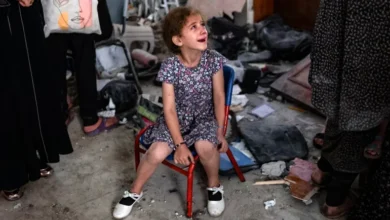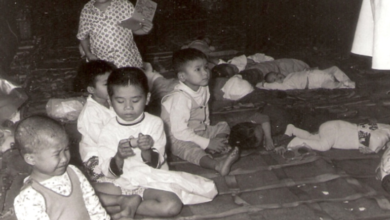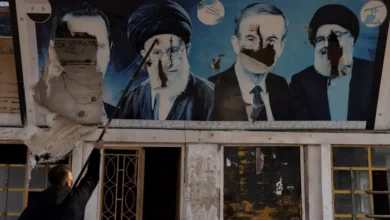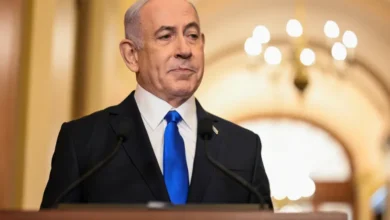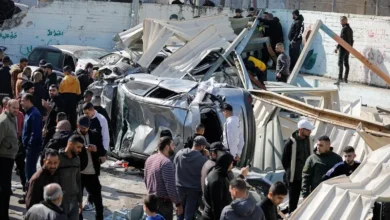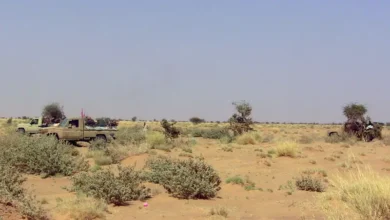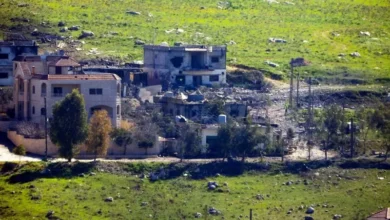Dirty secret of Israel’s weapons exports: They’re tested on Palestinians
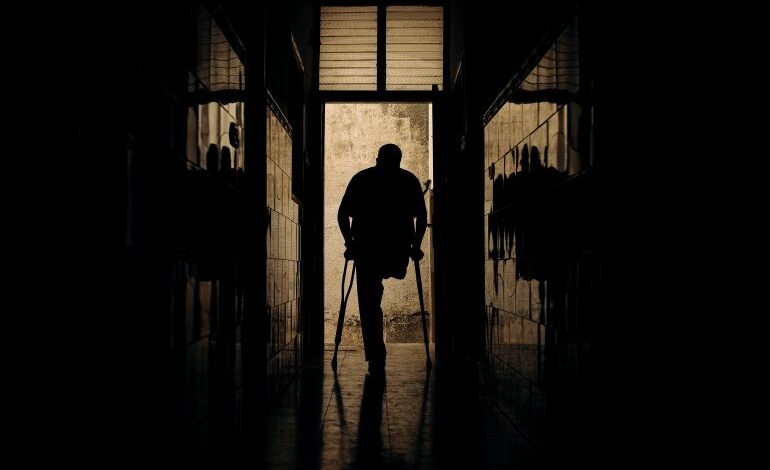
The Israeli army released footage on October 22 of its Maglan commando unit deploying a new precision-guided 120mm mortar bomb called the Iron Sting, against Hamas in Gaza.
The bomb’s Haifa-based manufacturer, Elbit Systems, has been advertising its qualities on the public relations page of its website since March 2021, when it was integrated into the Israeli military.
Benny Gantz, then Israel’s defence minister and now a part of Prime Minister Benjamin Netanyahu’s war cabinet, described the Iron Sting as “designed to engage targets precisely, in both open terrains and urban environments, while reducing the possibility of collateral damage and preventing injury to non-combatants”.
It’s a claim echoed by Mark Regev, Netanyahu’s former spokesperson, for the country’s overall approach to its war on Gaza, in which, he has said, Israel is “trying to be as surgical as humanly possible”.
Yet, more than one month after Israel launched the aerial bombardment of Gaza following a surprise Hamas attack, it has killed at least 11,400 Palestinian civilians, and injured 30,000 in the besieged strip and the occupied West Bank. More than 4,700 of Gaza’s children are dead. Hamas fighters killed 1,200 people in their October 7 attack.
Israel’s devastatingly “surgical” killing machines, tested on Palestinians, have global takers, say analysts.
‘Tissue torn from flesh’
Ahmed Saeed al-Najar, 28, was driving his taxi in Rafah during Gaza’s third war of 2014 when a drone missile came in through the open sunroof of his taxi. It exploded in the car, instantly decapitating and killing all six of his passengers, his best friend included.
The car had been targeted by an Israeli Spike drone rocket, which can be modified to carry a fragmentation sleeve of thousands of 3mm tungsten cubes, said to affect an area of approximately 20 metres in diameter. The cubes puncture metal and “cause tissue to be torn from flesh”, literally shredding anyone within range, according to Erik Fosse, a Norwegian doctor working in Gaza.
Al-Najar, rescued from the wreckage of his car, suffered extensive burns, the loss of his right eye, multiple shrapnel wounds and the loss of his right leg from the mid-thigh point, amputated by the blast.
The Heron TP “Eitan” drone is Israel’s largest unmanned aerial vehicle (UAV) and was brought into service in 2007. Manufactured by the state-owned Israel Aerospace Industries (IAI) — Israel’s largest aerospace and defence company and the country’s largest industrial exporter – it can fly up to 40 hours continuously and can carry four Spike missiles.
The Eitan was first used during “Operation Cast Lead” in the 2008-09 Gaza war for attacks against civilians, according to the non-governmental organisation, Drone Wars UK. According to Defence for Children International, of the 353 children killed and 860 injured during Operation Cast Lead, 116 died from missiles launched by drones.
After the war, IAI witnessed a surge in orders of Heron variant drones from at least 10 countries between 2008-2011. During this period, more than 100 drones were purchased, leased or acquired under joint venture schemes.
India – Israel’s largest military buyer, which operates more than 100 Israeli-made UAVs – purchased 34 Heron drones in this period, followed by France (24), Brazil (14) and Australia (10), according to a 2014 report by Drone Wars UK.
‘An insurance policy’
Weapons exports have uses beyond the revenue they bring to Israel.
“It’s more than that, it’s also an insurance policy to insulate themselves from the intense pressure to change their behaviour over the decades-long occupation of Palestinians,” said Loewenstein.
Last month, Colombian President Gustavo Petro refused to condemn the surprise attack launched by Hamas on October 7 as a “terrorist attack” instead responding that “terrorism is killing innocent children in Palestine”.
In response, the Israeli government halted all sales of defence and security equipment and associated services to the Latin American country.
Colombia is one of an estimated 130 countries that have bought weapons, drones and cyberspying technology from Israel, the world’s 10th-largest weapons exporter.
Israel is, by far, the world’s largest exporter of military drones: in 2017, it was estimated that it was behind nearly two-thirds of all UAV exports over the previous three decades.
Elbit, the maker of the Iron Sting, provides up to 85 percent of the land-based equipment procured by the Israeli military and about 85 percent of its drones, according to Database of Israeli Military and Security Export (DIMSE).
But after the 2014 Gaza war, its export market expanded significantly, too. Elbit promotes its Hermes UAVs as “combat-proven” and the “primary platform of the IDF in counter-terror operations”.
The Hermes 450 and Hermes 900 were both used extensively in “Operation Protective Edge”, Israel’s 2014 war, during which 37 percent of fatalities were attributed to drone attacks, according to an estimate by the Gaza-based Al Mezan Center for Human Rights.
Elbit subsequently secured contracts for the new Hermes 900 drone with more than 20 countries worldwide including the Philippines, which purchased 13, as well as India, Azerbaijan, Canada, Brazil, Chile, Colombia, Iceland, the European Union, Mexico, Switzerland and Thailand. In March 2023, Elbit Systems announced their 120th order for the Hermes 900.
The new “Nizoz” (Spark) surveillance drone manufactured by Rafael, a state-owned weapons contractor that forms the Big Three of Israel’s arms industry with IAI and Elbit, has reportedly now entered the current Gaza war. Rafael has an order backlog which currently stands at $10.1bn.
Al Jazeera approached Elbit Systems, Rafael Advanced Defense Systems and IAI for comment but the firms were yet to respond before time of publication.
Hard to track
For all of its military export successes, the full extent of Israel’s defence industry sales remains masked.
A report from Amnesty International in 2019 noted that the whole process by which Israel sells arms is shrouded in secrecy “with no documentation of sales, one cannot know when [these arms] were sold, by which company, how many and so on”.
Amnesty found that “Israeli companies exported weapons which reached their destination after a series of transactions, thereby skirting international monitoring”.
